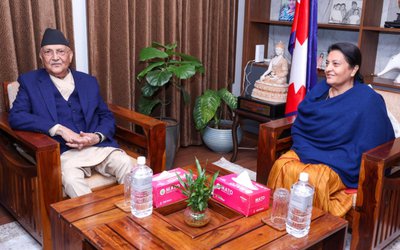More on Interview




Ambassador and Head of the European Union Delegation to Nepal ALEXANDER SPACHIS, who studied engineering and business administration in Athens, Greece, completed a Masters and a Doctoral Degree in Management at Imperial College Business School, University of London. In September 2008, he took charges of the European Commission Delegation to Nepal in Kathmandu. In November 2009, he was appointed as the first fully accredited European Union Ambassador to Nepal. From 2004 to August 2008, he was the Deputy Head of the European Commission Delegation to India. SPACHIS responded to a written interview for NEW SPOTLGIHT on various issues on EU supports to Nepal. Excerpts:
How do you see the relation between Nepal and the European Union (EU) Delegation?
The EU has been working closely with the Government of Nepal and other stakeholders for many years now and continues to strive to become a trusted partner in key areas of development cooperation. Our political and economic relations are guided by the fundamental principles of peace, stability, democracy, human rights and prosperity. The EU delegation - a fully-fledged diplomatic mission as of March 2011 - plays a key role in the implementation of the external assistance to Nepal and is responsible for identifying EU projects, assessing their feasibility, as well as implementing and evaluating their results.
As a leading development partner of Nepal, how can the EU Delegation support Nepal?
The EU as a whole - including the EU Delegation and the EU Member States - is the most generous donor of untied development aid to Nepal. Over the last four decades of EU Nepal cooperation there has been a significant increase in the volume of aid. The overall development cooperation strategy has been worked out in consultation with the Government of Nepal and resulted in the preparation of a seven-year Country Strategy Paper (2007-2013). The total amount of development assistance currently committed which is channeled through the EU Delegation reaches over €150 million (approximately NPR 15 billion) during this period.
What are the focus areas of interest for the EU Delegation?
For the period 2007-2013, the EU Delegation has chosen to focus its activities on three focal areas: Education; Stability and Peace Building; and, Trade Facilitation and Economic Capacity Building. In addition, the Delegation supports cooperation activities in non-focal areas such as poverty reduction, integrated rural development, human rights, preservation of the culture of indigenous communities, environmental conservation and sustainable development, basic and primary education, urban development, food security, economic capacity building and migration amongst others.
How do you see the process of implementation of your programs?
In addition to our bilateral relations with the Government of Nepal, we work through UN agencies and civil society to implement a broad spectrum of development cooperation activities. We regularly publish Calls for Proposals where we invite NGOs to submit proposals for grant funding. This competitive process ensures that projects are selected for their high-quality design, value for money, and potential for long-term, sustainable impact beyond the lifetime of the EU grant.
What kind of programs does the European delegation see as a priority in Nepal?
Our priority is to help Nepal capitalize on the recent peace dividends and promote a robust, democratic system of good governance that will enable real and sustainable economic development. We will continue our work in the three main focal areas, as well as our various regional and thematic programs: the European Instrument for Democracy and Human Rights (EIDHR); the Non-State Actors and Local Authorities (NSA-LA) program; 'Investing in People' program; and Migration and Asylum thematic programs. Particularly our support for Civil Society organizations is and will remain one of the key pillars of our assistance to Nepal. Finally, we are also looking forward to increase our assistance in the education, elections and trade sectors.
How has prolonged political instability been affecting the projects?
The context for our development cooperation in Nepal has remained challenging due to the unstable political situation. Government leadership and accountability is essential for the successful implementation of our programmes and projects across the country. Therefore, the EU encourages a stable system where democracy and rule of law are at the centre. Political stability and consensus are needed in order to provide a basis for economic prosperity and sustainable development in Nepal.
What is your impression about Nepal’s constitution making and ongoing peace process?
The EU attaches a great importance to the drafting of a democratic and inclusive constitution. A constitution drawn by representatives elected by the people is a good foundation for a stable democratic process. This is a pivotal time in Nepal and there is a strong public expectation for a rapid completion of the process. The EU looks forwards to the finalisation of the Constitution which will pave the way for free and fair elections and is essential to ensure lasting peace and stability in Nepal. It is also important to complete the integration of the former Maoist combatants into the Nepal Army Directorate. We are pleased to note that the discharge of the former Maoist combatants who chose Voluntary Retirement has now been completed. Although the process has faced some challenges along the road, the farewell to those who opted for Voluntary Retirement has infused hope that the process is on track. This momentum should be carried forward to complete the peace process as well as constitution making. The EU Delegation is fully supportive of Nepal's efforts towards lasting peace and stability, and we will continue our assistance and funding, such as through the Nepal Peace Trust Fund.
How do you see the option of a blanket amnesty proposed by two bills Disappearance bill and Truth and Reconciliation bill?
The Bills establishing a Truth and Reconciliation Commission and a Commission of Inquiry on Disappearances should adequately address impunity – which Nepal’s politicians have committed to tackle - and be in line with Nepal’s obligations under international law. Should the bills include blanket amnesty, it would risk contravening Nepal's obligations under the international human rights treaties it has signed and ignore the needs of victims. The EU believes that transitional justice institutions which have extensive truth-seeking powers and are genuinely independent are essential to give victims an opportunity for healing. Nepal could set an example regarding its commitments to abide by the international treaties by ensuring that large scale rights violations are seriously looked into.
As Nepal’s problem is alarmingly high unemployment rate and rising poverty level, how can European Delegation contribute to bring a change?
The recent results of the third Nepal Living Standard Survey (NLSS) indicate that overall poverty levels have decreased thanks to remittances. However, as men leave their communities to work overseas, the women are left behind to not only take care of the families, but also to take on the responsibilities of managing the economic activities of the household. The EU supports targeted efforts to fully exploit the interrelationship between migration, mobility and employment. Our programmes are aimed at helping countries such as Nepal reap the benefits of access to globally integrated markets.
High unemployment is another critical issue for Nepal. In this context, we are having discussion with the government on creating a large-scale project and trade and private sector development (TPSD). Eventually, the TPSD would improve trade flow and create employment opportunities for young Nepalis. In addition, we are working with other EU Member States, such as DFID and DANIDA, to improve economic growth and generate employment.
Nepal is one of the vulnerable countries in terms of natural disaster and climate change. How has the EU Delegation been supporting Nepal?
The European Union together with DFID have recently extended a grant of EURO 16.5 million (NPR approx 1.8 billion) for the ‘Climate Change Support Programme: Building Climate Resilience in Nepal’. Out of the EURO 16.5 million in total, the Government of the United Kingdom will provide EURO 7.9 million and the EU will provide EURO 8.6 million. This joint EU-DFID programme should help the Government of Nepal to integrate climate change considerations into its development planning, as well as in its implementation of concrete measures at the local level to help rural communities adapt to the consequences of climate change.
In the area of disaster risk reduction the EU provides support to Nepal through its Humanitarian Aid and Civil Protection department (DG ECHO). ECHO's work contributes to all five Flagship programmes of the Nepal Risk Reduction Consortium. In partnership with NGOs, projects include enhancing community and national preparedness and resilience, through awareness-raising, advocacy, mitigation measures and capacity building.
Europe is going through an economic crisis; will this affect the support given to Nepal from the European Delegation? If so, how?
The economic crisis should not be used as an excuse to cut aid. Despite the current crisis, the EU remains a staunch and committed supporter of development assistance. Future EU development aid spending will target countries that are in the greatest need of external support and where it can really make a difference. As such, least Developed Countries (LDCs), such as Nepal, will receive an even bigger share of our EU aid. The EU Delegation will continue to stand by Nepal, supporting the government and the people of Nepal to move towards a new future.
.







